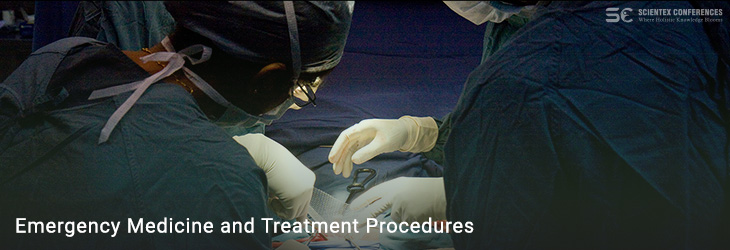Track: Emergency Medicine and Treatment Procedures

Welcome to our interactive session on "Emergency Medicine and Treatment Procedures" where we will share information on the exciting world of emergency care. Be it a sudden crisis in health, a traumatic injury, or a potentially life-threatening condition; it is always the first line of defense that institutes rapid and decisive action when every second counts. This module will walk you through essential aspects of emergency medicine—from its pivotal role to common emergencies and how to integrate emergency care into the primary setting and, more broadly, healthcare emergency management. Engage with some of the compelling insights and practical knowledge that underpin this important field.
Role of Emergency Medicine: Emergency medicine is like the pit crew in a high-speed race—always ready to jump in and make critical adjustments in the blink of an eye. This field is dedicated to providing immediate care in urgent situations, from handling severe trauma to stabilizing patients in life-threatening conditions. We’ll delve into the responsibilities and impact of emergency medicine, exploring how it coordinates with other specialties to ensure that patients receive swift and effective treatment, ultimately saving lives and improving outcomes during crucial moments.
Common Medical Emergencies: In the world of emergency medicine, speed and precision are key. We’ll walk you through some of the most common medical emergencies, such as cardiac arrest, strokes, and severe trauma.
Importance of Emergency Care: Emergency care isn’t just about putting out fires; it’s about being a beacon of hope during crises. This topic highlights the profound impact of emergency care on saving lives, reducing complications, and enhancing overall health outcomes.
Emergency Medicine in Primary Care: Imagine a primary care setting that’s not only equipped to handle routine health issues but also ready to tackle urgent emergencies. This integration of emergency medicine within primary care settings means that providers are prepared to manage acute conditions and provide continuous care. We’ll discuss how primary care practices can enhance their readiness for emergencies, the benefits of having emergency preparedness protocols in place, and the synergy between primary care and emergency services for a comprehensive approach to patient care.
Potential of Primary Healthcare in Emergency Medicine: Primary healthcare has significant potential to enhance emergency medicine by improving preparedness and response capabilities. Recent research explores how primary care can contribute to emergency management through proactive patient monitoring, development of emergency response plans, and integration with broader healthcare systems. We’ll discuss innovative practices and case studies demonstrating how primary care providers can support emergency medicine efforts and improve overall emergency response efficacy.
Healthcare Emergency Management: Effective healthcare emergency management involves strategic planning, coordination, and resource allocation to address public health crises. Current research focuses on optimizing emergency management systems, developing robust response frameworks, and leveraging data for better decision-making. This topic will examine recent advancements in emergency management, including risk assessment methodologies, resource management strategies, and best practices for large-scale emergency response. Understanding these developments is essential for building resilient healthcare systems capable of managing diverse emergencies.
Overall Insights: Our session on "Emergency Medicine and Treatment Procedures" has explored key aspects of emergency care, including its critical role, common emergencies, and integration with primary care. Highlighting current research and innovations, we aimed to enhance your understanding of the evolving field of emergency medicine. We hope you found the insights valuable and look forward to further discussions on these important topics.
Scientific Highlights
- Public Healthcare and Management
- Role of Primary Care in COVID 19 Pandemic
- Emergency Medicine and Treatment Procedures
- Seasonal Allergies & Primary Care Treatments
- Maternal Health in Primary Care
- Mental Health, Addiction, and Public Health Awareness in Primary Care
- Global & Public Health Initiatives
- Primary Care Oncology
- Primary Care Cardiology
- Primary Care Urology
- Quality in Primary Care and Epidemiology
- Infectious Diseases and Public Health
- Surgical Care, Critical Care, and Emergency Nursing
- Primary Care Advancements in Diabetes and Obesity
- Pediatrics and Nurse Practitioners
- Geriatric Care in Public Health
- Primary Health Care and Family Medicine
- Orthopedic Primary Care
- Primary Care Dermatology
- Reproductive and Sexual Health
- Primary Care Ophthalmology
- Primary Care Dentistry
- Chronic Disease Management in Primary Care


